口语期末考试复习范围
- 格式:doc
- 大小:46.50 KB
- 文档页数:7
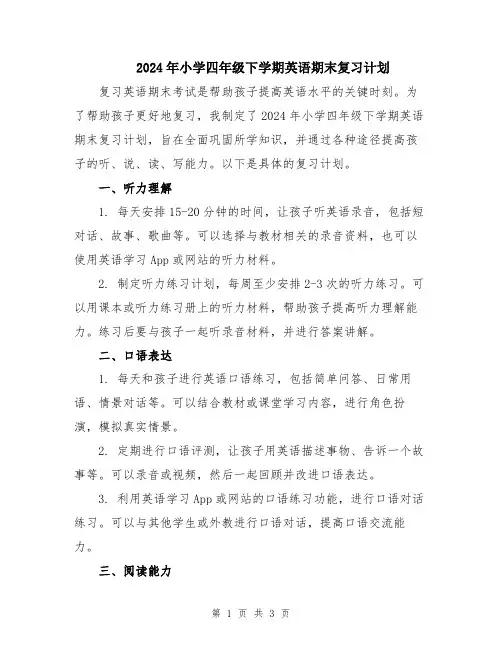
2024年小学四年级下学期英语期末复习计划复习英语期末考试是帮助孩子提高英语水平的关键时刻。
为了帮助孩子更好地复习,我制定了2024年小学四年级下学期英语期末复习计划,旨在全面巩固所学知识,并通过各种途径提高孩子的听、说、读、写能力。
以下是具体的复习计划。
一、听力理解1. 每天安排15-20分钟的时间,让孩子听英语录音,包括短对话、故事、歌曲等。
可以选择与教材相关的录音资料,也可以使用英语学习App或网站的听力材料。
2. 制定听力练习计划,每周至少安排2-3次的听力练习。
可以用课本或听力练习册上的听力材料,帮助孩子提高听力理解能力。
练习后要与孩子一起听录音材料,并进行答案讲解。
二、口语表达1. 每天和孩子进行英语口语练习,包括简单问答、日常用语、情景对话等。
可以结合教材或课堂学习内容,进行角色扮演,模拟真实情景。
2. 定期进行口语评测,让孩子用英语描述事物、告诉一个故事等。
可以录音或视频,然后一起回顾并改进口语表达。
3. 利用英语学习App或网站的口语练习功能,进行口语对话练习。
可以与其他学生或外教进行口语对话,提高口语交流能力。
三、阅读能力1. 每天安排一定时间,让孩子阅读英语故事书、绘本或简单的英语材料。
可以先从简单的故事开始,逐渐增加难度。
2. 每周选取一个主题,让孩子阅读相关的英语文章,并进行讨论。
可以提前准备一些问题,引导孩子思考和表达观点。
3. 利用英语学习App或网站的阅读练习功能,进行阅读理解练习。
可以选择与课文相关的材料,帮助孩子更好地理解和运用所学知识。
四、写作能力1. 每周选择一个话题,让孩子进行英语写作练习。
可以写一篇短文、一封信件或一个故事等。
鼓励孩子多用所学的词汇和句型,提高写作表达能力。
2. 帮助孩子改进写作,包括检查语法错误、词汇使用等。
可以选择一些优秀的作文范文,与孩子一起分析和学习。
3. 利用英语学习App或网站的写作练习功能,进行写作训练。
可以选择一些写作题目,让孩子进行写作练习,并进行互评。
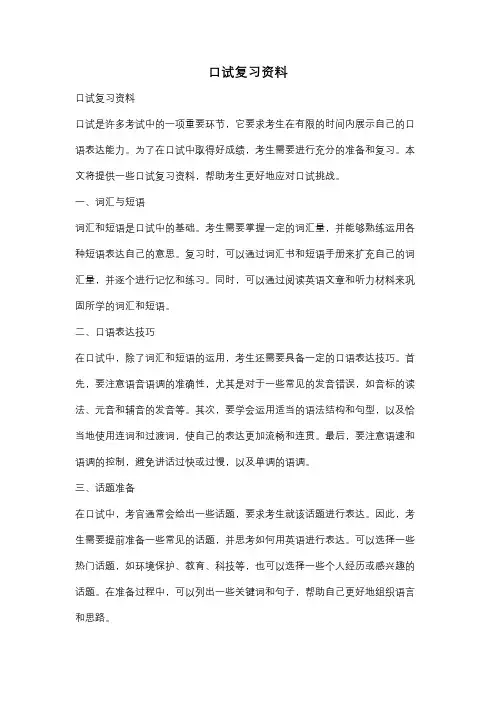
口试复习资料口试复习资料口试是许多考试中的一项重要环节,它要求考生在有限的时间内展示自己的口语表达能力。
为了在口试中取得好成绩,考生需要进行充分的准备和复习。
本文将提供一些口试复习资料,帮助考生更好地应对口试挑战。
一、词汇与短语词汇和短语是口试中的基础。
考生需要掌握一定的词汇量,并能够熟练运用各种短语表达自己的意思。
复习时,可以通过词汇书和短语手册来扩充自己的词汇量,并逐个进行记忆和练习。
同时,可以通过阅读英语文章和听力材料来巩固所学的词汇和短语。
二、口语表达技巧在口试中,除了词汇和短语的运用,考生还需要具备一定的口语表达技巧。
首先,要注意语音语调的准确性,尤其是对于一些常见的发音错误,如音标的读法、元音和辅音的发音等。
其次,要学会运用适当的语法结构和句型,以及恰当地使用连词和过渡词,使自己的表达更加流畅和连贯。
最后,要注意语速和语调的控制,避免讲话过快或过慢,以及单调的语调。
三、话题准备在口试中,考官通常会给出一些话题,要求考生就该话题进行表达。
因此,考生需要提前准备一些常见的话题,并思考如何用英语进行表达。
可以选择一些热门话题,如环境保护、教育、科技等,也可以选择一些个人经历或感兴趣的话题。
在准备过程中,可以列出一些关键词和句子,帮助自己更好地组织语言和思路。
四、模拟练习模拟练习是口试复习中的重要环节。
考生可以找到一些口试模拟题,或者请朋友或老师扮演考官进行模拟口试。
在模拟口试中,考生要注意时间的掌握和答题的准确性。
可以通过录音或视频来记录自己的表现,并进行反复听和观察,找出自己的不足之处,并加以改进。
五、自信与放松在参加口试之前,考生要保持自信和放松的心态。
自信可以帮助考生更好地展示自己的实力,而放松可以减少紧张和焦虑的情绪。
可以通过一些放松的方法,如深呼吸、冥想或听音乐来帮助自己放松。
同时,要相信自己的努力和准备,相信自己可以顺利完成口试。
综上所述,口试复习是考生在备战口试时必不可少的一部分。
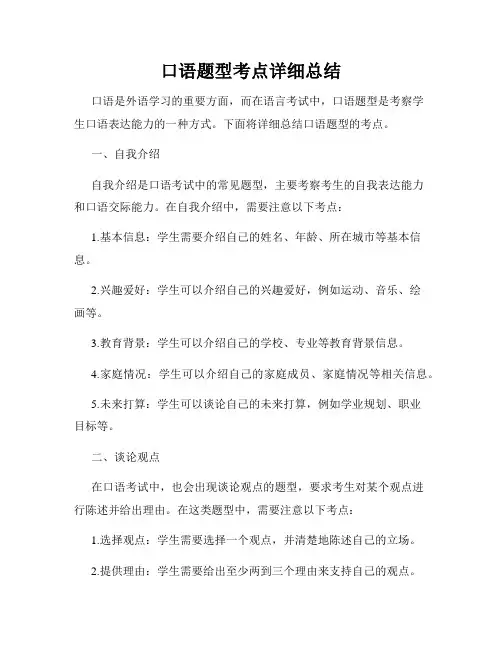
口语题型考点详细总结口语是外语学习的重要方面,而在语言考试中,口语题型是考察学生口语表达能力的一种方式。
下面将详细总结口语题型的考点。
一、自我介绍自我介绍是口语考试中的常见题型,主要考察考生的自我表达能力和口语交际能力。
在自我介绍中,需要注意以下考点:1.基本信息:学生需要介绍自己的姓名、年龄、所在城市等基本信息。
2.兴趣爱好:学生可以介绍自己的兴趣爱好,例如运动、音乐、绘画等。
3.教育背景:学生可以介绍自己的学校、专业等教育背景信息。
4.家庭情况:学生可以介绍自己的家庭成员、家庭情况等相关信息。
5.未来打算:学生可以谈论自己的未来打算,例如学业规划、职业目标等。
二、谈论观点在口语考试中,也会出现谈论观点的题型,要求考生对某个观点进行陈述并给出理由。
在这类题型中,需要注意以下考点:1.选择观点:学生需要选择一个观点,并清楚地陈述自己的立场。
2.提供理由:学生需要给出至少两到三个理由来支持自己的观点。
3.使用例子:学生可以通过使用具体的例子来加强自己观点的说服力。
4.对立观点:学生还可以提及对立的观点,并给出反驳或者回应。
三、描述图片在口语考试中,经常会出现要求学生描述或者谈论图片的题型,考察学生的观察力和描述能力。
在描述图片的时候,需要注意以下考点:1.人物描述:学生可以描述图片中的人物外貌特征、动作姿势等。
2.场景描述:学生可以描述图片中的场景、环境等。
3.时间描述:学生可以描述图片中的时间、季节等。
4.情感表达:学生可以谈论他们对图片的感受、喜好等。
四、讨论话题讨论话题是口语考试中的常见题型,要求学生就某个话题展开讨论并表达自己的观点。
在讨论话题的过程中,需要注意以下考点:1.理解题目:学生需要仔细阅读题目,并确保自己理解了题目的要求。
2.展开讨论:学生需要围绕话题展开自己的观点,并与其他学生进行互动。
3.提供例子:学生可以通过提供具体的例子来支持自己的观点。
4.给出建议:学生可以根据话题给出自己的建议或者解决方案。
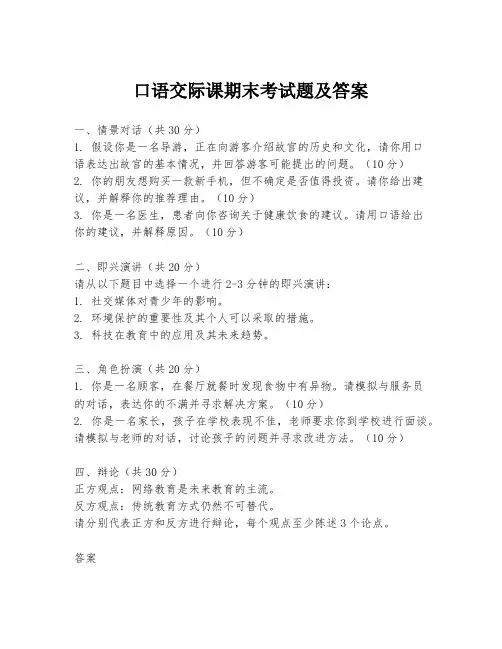
口语交际课期末考试题及答案一、情景对话(共30分)1. 假设你是一名导游,正在向游客介绍故宫的历史和文化,请你用口语表达出故宫的基本情况,并回答游客可能提出的问题。
(10分)2. 你的朋友想购买一款新手机,但不确定是否值得投资。
请你给出建议,并解释你的推荐理由。
(10分)3. 你是一名医生,患者向你咨询关于健康饮食的建议。
请用口语给出你的建议,并解释原因。
(10分)二、即兴演讲(共20分)请从以下题目中选择一个进行2-3分钟的即兴演讲:1. 社交媒体对青少年的影响。
2. 环境保护的重要性及其个人可以采取的措施。
3. 科技在教育中的应用及其未来趋势。
三、角色扮演(共20分)1. 你是一名顾客,在餐厅就餐时发现食物中有异物。
请模拟与服务员的对话,表达你的不满并寻求解决方案。
(10分)2. 你是一名家长,孩子在学校表现不佳,老师要求你到学校进行面谈。
请模拟与老师的对话,讨论孩子的问题并寻求改进方法。
(10分)四、辩论(共30分)正方观点:网络教育是未来教育的主流。
反方观点:传统教育方式仍然不可替代。
请分别代表正方和反方进行辩论,每个观点至少陈述3个论点。
答案一、情景对话答案示例:1. 故宫,又称紫禁城,是中国古代皇家宫殿,位于北京城中心。
它始建于明朝,是中国古代建筑的杰出代表。
故宫拥有丰富的文物藏品和深厚的历史文化底蕴。
如果您对故宫的某个部分感兴趣,我可以为您提供详细的介绍。
2. 我建议您考虑购买这款手机,因为它具有最新的处理器、优秀的摄像头和持久的电池寿命。
此外,它的价格相对合理,性价比很高。
3. 我建议您采取均衡饮食,多吃蔬菜和水果,减少油腻和高糖食物的摄入。
同时,保持适量的运动,有助于维持健康的身体。
二、即兴演讲答案示例:1. 社交媒体对青少年的影响是双面的。
一方面,它为青少年提供了获取信息和交流的平台;另一方面,过度依赖社交媒体可能导致青少年沉迷网络,影响学习和生活。
2. 环境保护是每个人的责任。
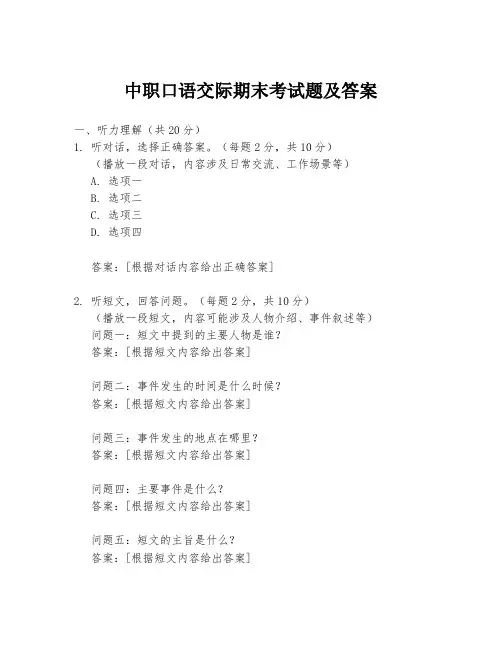
中职口语交际期末考试题及答案一、听力理解(共20分)1. 听对话,选择正确答案。
(每题2分,共10分)(播放一段对话,内容涉及日常交流、工作场景等)A. 选项一B. 选项二C. 选项三D. 选项四答案:[根据对话内容给出正确答案]2. 听短文,回答问题。
(每题2分,共10分)(播放一段短文,内容可能涉及人物介绍、事件叙述等)问题一:短文中提到的主要人物是谁?答案:[根据短文内容给出答案]问题二:事件发生的时间是什么时候?答案:[根据短文内容给出答案]问题三:事件发生的地点在哪里?答案:[根据短文内容给出答案]问题四:主要事件是什么?答案:[根据短文内容给出答案]问题五:短文的主旨是什么?答案:[根据短文内容给出答案]二、口语表达(共30分)1. 根据给定情景,进行口语表达。
(每题5分,共10分)情景一:你是一名服务员,顾客投诉食物质量有问题。
答案:[给出合适的口语表达示例]情景二:你是一名导游,正在向游客介绍景点。
答案:[给出合适的口语表达示例]2. 角色扮演。
(每题10分,共20分)角色一:你是一名销售员,正在向顾客推销产品。
答案:[给出合适的口语表达示例]角色二:你是一名客服人员,正在处理顾客的投诉。
答案:[给出合适的口语表达示例]三、阅读理解(共20分)1. 阅读短文,选择正确答案。
(每题2分,共10分)(给出一篇短文,内容涉及日常生活、工作场景等)A. 选项一B. 选项二C. 选项三D. 选项四答案:[根据短文内容给出正确答案]2. 阅读短文,回答问题。
(每题2分,共10分)问题一:短文中提到的问题是什么?答案:[根据短文内容给出答案]问题二:短文中的解决方案有哪些?答案:[根据短文内容给出答案]问题三:短文的作者持有什么观点?答案:[根据短文内容给出答案]问题四:短文中提到的主要人物是谁?答案:[根据短文内容给出答案]问题五:短文的结论是什么?答案:[根据短文内容给出答案]四、写作(共30分)1. 根据给定话题,写一篇不少于200字的短文。
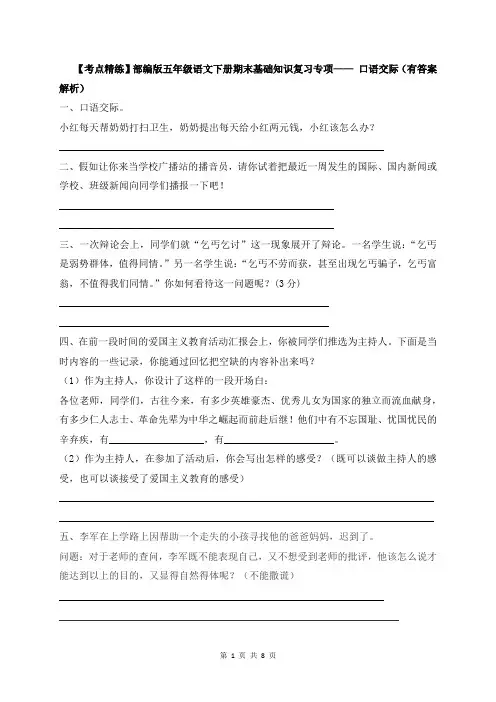
【考点精练】部编版五年级语文下册期末基础知识复习专项——口语交际(有答案解析)一、口语交际。
小红每天帮奶奶打扫卫生,奶奶提出每天给小红两元钱,小红该怎么办?_________________________________________________________________二、假如让你来当学校广播站的播音员,请你试着把最近一周发生的国际、国内新闻或学校、班级新闻向同学们播报一下吧!______________________________________________________________________________________________________________三、一次辩论会上,同学们就“乞丐乞讨”这一现象展开了辩论。
一名学生说:“乞丐是弱势群体,值得同情。
”另一名学生说:“乞丐不劳而获,甚至出现乞丐骗子,乞丐富翁,不值得我们同情。
”你如何看待这一问题呢?(3分)____________________________________________________________________________________________________________四、在前一段时间的爱国主义教育活动汇报会上,你被同学们推选为主持人。
下面是当时内容的一些记录,你能通过回忆把空缺的内容补出来吗?(1)作为主持人,你设计了这样的一段开场白:各位老师,同学们,古往今来,有多少英雄豪杰、优秀儿女为国家的独立而流血献身,有多少仁人志士、革命先辈为中华之崛起而前赴后继!他们中有不忘国耻、忧国忧民的辛弃疾,有___________________,有______________________。
(2)作为主持人,在参加了活动后,你会写出怎样的感受?(既可以谈做主持人的感受,也可以谈接受了爱国主义教育的感受)___________________________________________________________________________ ___________________________________________________________________________ 五、李军在上学路上因帮助一个走失的小孩寻找他的爸爸妈妈,迟到了。
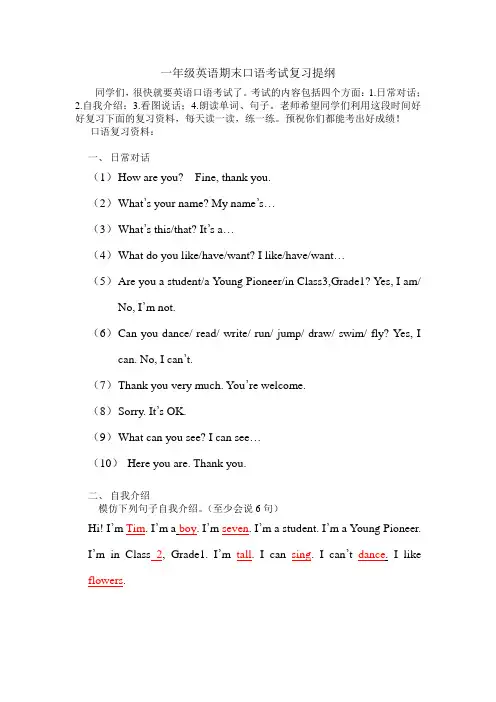
一年级英语期末口语考试复习提纲同学们,很快就要英语口语考试了。
考试的内容包括四个方面:1.日常对话;2.自我介绍;3.看图说话;4.朗读单词、句子。
老师希望同学们利用这段时间好好复习下面的复习资料,每天读一读,练一练。
预祝你们都能考出好成绩!口语复习资料:一、日常对话(1)H ow are you? Fine, thank you.(2)W hat’s your name? My name’s…(3)W hat’s this/that? It’s a…(4)W hat do you like/have/want? I like/have/want…(5)A re you a student/a Y oung Pioneer/in Class3,Grade1? Y es, I am/ No, I’m not.(6)C an you dance/ read/ write/ run/ jump/ draw/ swim/ fly? Yes, I can. No, I can’t.(7)T hank you very much. Y ou’re welcome.(8)S orry. It’s OK.(9)W hat can you see? I can see…(10)Here you are. Thank you.二、自我介绍模仿下列句子自我介绍。
(至少会说6句)Hi! I’m Tim. I’m a boy. I’m seven. I’m a student. I’m a Y oung Pioneer.I’m in Class2, Grade1. I’m tall. I can sing. I can’t dance. I like flowers.三、看图说话。
1.描述出小动物的颜色、身形,它会做什么,以及不会什么。
参考一下句型:This is a ________. It’s _______. It’s________.It can ______. It can’t________.2.描述下列物品的位置。
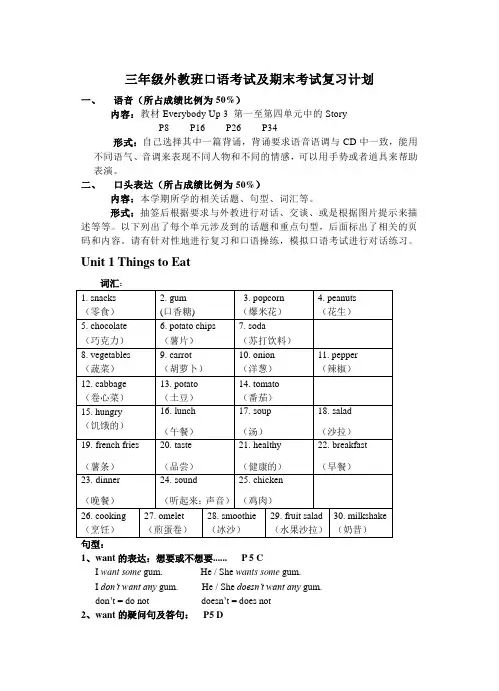
三年级外教班口语考试及期末考试复习计划一、语音(所占成绩比例为50%)内容:教材Everybody Up 3 第一至第四单元中的StoryP8 P16 P26 P34形式:自己选择其中一篇背诵,背诵要求语音语调与CD中一致,能用不同语气、音调来表现不同人物和不同的情感,可以用手势或者道具来帮助表演。
二、口头表达(所占成绩比例为50%)内容:本学期所学的相关话题、句型、词汇等。
形式:抽签后根据要求与外教进行对话、交谈、或是根据图片提示来描述等等。
以下列出了每个单元涉及到的话题和重点句型,后面标出了相关的页码和内容。
请有针对性地进行复习和口语操练,模拟口语考试进行对话练习。
Unit 1 Things to Eat词汇:1、want的表达:想要或不想要...... P 5 CI want some gum. He / She wants some gum.I don’t want any gum. He / She doesn’t want any gum.don’t = do not doesn’t = does not2、want的疑问句及答句:P5 DWhat do you want? What does he / she want?I want some gum. He / She wants some gum.3、need的一般疑问句: P6 BDo you need any carrots?Yes, we do. / No, we don’t.4、need的特殊疑问句: P6 CWhat do they need?They need a carrot / some carrots.5、谈论有关一日三餐的话题P 8 A P9 DWhat’s for lunch?Soup and salad.That sounds good.6、谈论烹饪P10 BI want to make a / an.... I need some....Unit 2 Around Town句型:1.询问地点:P13 C DWhere’s the park?It’s across from the movie theater.It’s between the school and the movie theater.2.现在进行时的问答:P14 B P15 CWhat’s he /she doing at the department store ?He’s / She’s shopping.What are they doing at the department store ?They’re shopping.3、谈论地点方位P16 A P17 DExcuse me. Where’s the post office?It’s over there.Unit 3 People in Town词汇:句型:1、work的表达:工作人员&工作地点......The cashier works at the supermarket. 回答职业The cashier works at the supermarket. 回答工作地点I work He/She works2、work的疑问句及答句:P23 C DWho works at the supermarket? Where does the cashier work?The cashier works at the supermarket. The cashier works at the supermarket.3、、简单谈论职业的内容P24 B P25 CWhat does the cook do? Does the cook make food?The cook makes food. Yes, he does./No, he doesn’t.4、谈论价钱P26 A P27 DExcuse me, how much is this sweater?It’s $30.5、谈论疾病P28 BWhat’s the matter with him/her?He/She has a cold.Unit 4 Getting Together句型:1、介绍家庭成员表达方式P31 CThey’re Danny’s parents.He’s / She’s Danny’s cousin.2、询问家庭成员关系的表达方式:P31 DWho’s he / she ?He’s / She’s his / her uncle / aunt.Who are they?They’re his / her parents.3、物主代词:(名词性物主代词)P32 BThis fork is mine.4、询问物品主人的表达方式:P33 CWhose fork is that?It’s mine.5、谈论如何使用餐具P34 AHow do you use chopsticks?Like this.6、物主代词:(形容词性物主代词与名词性物主代词)P35 B This is our / their flag.It’s ours / theirs.。
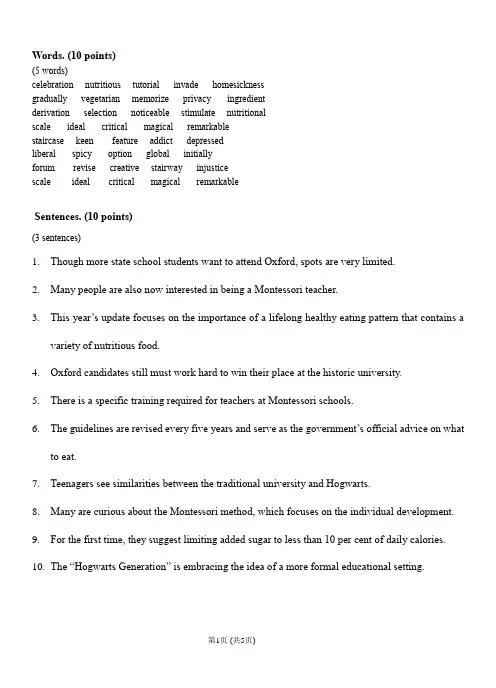
Words. (10 points)(5 words)celebration nutritious tutorial invade homesicknessgradually vegetarian memorize privacy ingredientderivation selection noticeable stimulate nutritionalscale ideal critical magical remarkablestaircase keen feature addict depressedliberal spicy option global initiallyforum revise creative stairway injusticescale ideal critical magical remarkableSentences. (10 points)(3 sentences)1.Though more state school students want to attend Oxford, spots are very limited.2.Many people are also now interested in being a Montessori teacher.3.This year’s update focuses on the importance of a lifelong healthy eating pattern that contains avariety of nutritious food.4.Oxford candidates still must work hard to win their place at the historic university.5.There is a specific training required for teachers at Montessori schools.6.The guidelines are revised every five years and serve as the government’s official advice onwhat to eat.7.Teenagers see similarities between the traditional university and Hogwarts.8.Many are curious about the Montessori method, which focuses on the individual development.9.For the first time, they suggest limiting added sugar to less than 10 per cent of daily calories.10.The “Hogwarts Generation” is embracing the idea of a more formal educational setting.11.There has been a 45 per cent increase in people looking to attend information sessions for teachers.12.Americans are also encouraged to consume less than 2300 milligrams of sodiumper day.13.Oxford is a very old university, the oldest English-speaking university in the world.14.If you are with your boss or someone like that, you are being careful about yourtable manners.15.She had this thing called a word board and I could point to words and phrases on it.16.Formal hall is when we all eat together here in college, the professors and thestudents.17.But most of the time, if you know each other well you would just go ahead andstart.18.This speech and language therapist came to see me every day for 12 weeks.19.It’s a very beautiful evening, because there’s a special meal and we eat bycandlelight.20.The rules will include any foods that are high in fat, salt and sugar.21.But they started treatment for the condition almost immediately.22.When the students take exams, they must go to a special building and it’s calledExamination Schools.23.This was thought to be over the top by representatives of the food industry.24.I don’t know what would have happened to me if I hadn’t had my family.Paragraph. (20 points)Oxford is a very old university, the oldest English-speaking university in the world. And so there’re many traditions which are associated with the colleges, with the times of the year, and with sport, and with eating, for example. Formal Hall is when we all eat together here in college, the professors and the students. Usually it takes place at seven o’clock in the evening, and the professors sit on high table, which is the table over here, and the students sit on common table, which are the tables here. But everybody eats together. It’s a very beautiful evening because there’s a special meal and we eat by candlelight.I saw Robin Williams come to the patio. I made the run, jumped a couple of sawhorses, climbed up a stairway, got in front of him, and said, “Robin, do you mind if I take a picture?” He goes, “After all that, how could I stop you?” I decided to use the small college town of North Hampton and go up there every Saturday night, and I put on the full uniform, photo vest, and press IDs, and I would lurk in doorways and follow people and jump out in front of them and take their picture. I’ve, you know, walked up with my camera behind me and then just pulled it out and shot it with the flash.With so many ingredients, people might expect it to taste not so good, but this drink is absolutely the best drink you’ll ever have. P eople actually develop a craving for this, an actual addiction, in a good way, for this positive food. So someone who’s never worked out in their life, someone who’s never eaten healthily in their life, could drink the shake and actually love drinking the shake, develop a craving for this good quality shake. It actually makes them want to continue this new lifestyle that they have.The government announced today that they are going to ban advertisements for junk food during TV programmes for children under the age of 16. The rules will include any foods that are high in fat, salt and sugar. There will be a total ban on ads during children’s programmes and on children’s channels, as well as adult programmes watched by a large number of children. But there will not be a total ban on all ads for junk food which are shown on television before 9 pm. This was thought to be “over the top” by representatives of the food industry.Well, first of all, you need to register with your local doctor. And, then of course, if you need to see him or her, you have to phone in and make an appointment which can be two or three days later. But, of course, if you have an accident and it’s more urgent, you go to a department called the Accident and Emergency Department, which is usually in a hospital. And, if it’s really urgent, someone will call a number, which is 999 here in Britain and you’ll get an ambulance.The first person charged under Californ ia’s 2010 anti-paparazzi law is asking the state supreme court to look at his case again. This law carries harsh punishments for the photographers who violate driving laws while chasing celebrities. According to documents, Paul is asking the California Supreme Court to declare the law unconstitutional since it targets only a specific class of individuals—photographers. The law was passed to address a growing rate of road incidents involving paparazzi pursuing celebrities at high speeds. If successful, the law could be overturned.If it’s a formal meal, maybe Thanksgiving or Christmas, or if you’re with your boss or someone like that, you are being careful about your table manners. So you’d wait until everyone is served before you eat. But most of the time, if you know each other we ll you would just go ahead and start. It’s more usual to entertain them at home because it shows your hospitality. We have a lot of barbecues outside, maybe in the garden or maybe at a campsite. But sometimes if you don’t want to cook, you can go to a rest aurant.I don’t know what would have happened to me if I hadn’t had my family. But they were there for me, they really were. I had something called aphasia, where the part of your brain gets damaged that affects your speech and language. But they started treatment for the condition almost immediately. This speech and language therapist came to see me every day for 12 weeks. They made me do all these exercises. I had to match words and pictures and say their names. You see, I’d also forgotten the names of a lot of things. She had this thing called a word board and I could point to words and phrases on it that I wanted to say. I had to repeat words up to 20 times.Topic Discussion. (60 points)Topic:Please tell me your understanding of the following quotes:Of course there’s a lot of knowledge in universities:The freshmen bring a little in; the seniors don’t take much away, so knowledge sort of accumulates. — Abbott Lawrence LowellTopic:What suggestions will you give to a foreign friend who has been invited to dinner at her Chinese friend’s home?Topic:We have access to various media, like TV, radio, the Internet, newspapers and magazines. Say which media you prefer and use the most and why.Topic:Can something that is addictive be good for you?Topic:A man who has never gone to school may steal from a freight car; but if he has a university education, he may steal the whole railroad. — Theodore RooseveltTopic:Do you think junk food advertising should be banned? Why or why not?Topic:How stressed are you in college?Topic:How do you feel about reality TV programmes?。
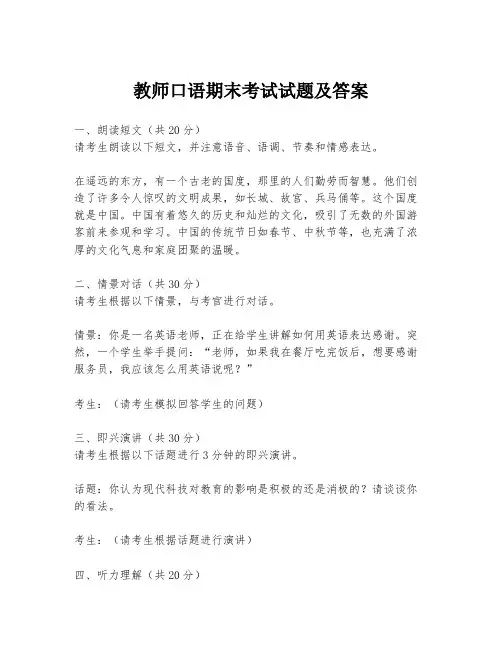
教师口语期末考试试题及答案一、朗读短文(共20分)请考生朗读以下短文,并注意语音、语调、节奏和情感表达。
在遥远的东方,有一个古老的国度,那里的人们勤劳而智慧。
他们创造了许多令人惊叹的文明成果,如长城、故宫、兵马俑等。
这个国度就是中国。
中国有着悠久的历史和灿烂的文化,吸引了无数的外国游客前来参观和学习。
中国的传统节日如春节、中秋节等,也充满了浓厚的文化气息和家庭团聚的温暖。
二、情景对话(共30分)请考生根据以下情景,与考官进行对话。
情景:你是一名英语老师,正在给学生讲解如何用英语表达感谢。
突然,一个学生举手提问:“老师,如果我在餐厅吃完饭后,想要感谢服务员,我应该怎么用英语说呢?”考生:(请考生模拟回答学生的问题)三、即兴演讲(共30分)请考生根据以下话题进行3分钟的即兴演讲。
话题:你认为现代科技对教育的影响是积极的还是消极的?请谈谈你的看法。
考生:(请考生根据话题进行演讲)四、听力理解(共20分)请考生听一段录音,录音结束后,回答以下问题。
问题1:录音中提到了哪些现代科技产品?问题2:录音中提到的科技产品对教育有哪些积极影响?问题3:录音中提到的科技产品对教育有哪些消极影响?考生:(请考生根据录音内容回答问题)答案:一、朗读短文答案考生的朗读应体现出正确的语音、语调、节奏和情感表达。
考官将根据考生的表现给出相应的分数。
二、情景对话答案考生应能够准确、流利地回答学生的问题,例如:“当你在餐厅吃完饭后,想要感谢服务员,你可以说'Thank you for your excellent service.'或者'I appreciate your help.'这样的表达既礼貌又表达了你的感激之情。
”三、即兴演讲答案考生的演讲应围绕现代科技对教育的影响展开,可以包括科技如何提高教学效率、丰富教学资源、促进学生自主学习等积极影响,也可以讨论科技可能导致的学生过度依赖、隐私泄露、网络成瘾等消极影响。

口语期末考试题及答案一、自我介绍(每题2分,共10分)1. 请用英语介绍你的姓名、年龄和家乡。
答案:My name is [Your Name], I am [Your Age] years old, and I come from [Your Hometown].2. 描述一下你的大学专业和为什么选择它。
答案:I am majoring in [Your Major] because [Reasons for choosing the major].3. 谈谈你的兴趣爱好。
答案:My hobbies include [List of Hobbies], which I enjoy doing in my spare time.4. 请描述一下你的家庭。
答案:I have a family of [Number of family members],including [family members and their roles].5. 你如何看待团队合作?答案:I believe teamwork is essential because it allows us to combine our strengths and achieve more than we could individually.二、日常对话(每题3分,共15分)6. 你如何与朋友安排一次聚会?答案:I would first discuss with my friends about the date and time that works best for everyone, then decide on a location and activity.7. 如果你迷路了,你会怎么做?答案:I would ask a local for directions or use a map or GPS on my phone to find my way.8. 描述一下你最喜欢的食物。
英语口语期末考试内容一、自我介绍(Self-introduction)1. 姓名、年龄、出生地、所在班级和学校等个人基本信息。
2. 家庭背景、兴趣爱好、特长技能等。
3. 目前的英语学习情况,平时如何提高口语能力。
二、日常生活(Daily Life)1. 描述自己的一天(One day in my life),包括起床、上学、午餐、课外活动、晚饭和睡觉等。
2. 谈论自己喜欢的食物、运动、电影或音乐等。
3. 介绍自己的家庭成员,包括父母、兄弟姐妹和宠物等。
三、个人兴趣(Hobbies)1. 谈论自己喜欢的运动、音乐、电影或书籍,并解释为什么喜欢。
2. 分享自己曾经参加过的一次有趣的活动或经历。
四、旅行经历(Travel Experience)1. 描述一次特别的旅行,包括目的地、旅行方式和所见所闻等。
2. 谈论对旅行的看法以及旅行对自己的影响。
五、学习经历(Learning Experience)1. 谈论自己在学校的学习经历,包括学习方法、困难和取得的进步等。
2. 分享一次自己参加的有意义的学习活动或课程。
六、未来规划(Future Plans)1. 谈论自己对未来的规划,包括就业、进修或创业等。
2. 说明为什么选择这个方向,并提及自己的目标和计划。
七、社交活动(Social Activities)1. 分享一次自己参加的有趣的社交活动,如聚会、活动或志愿者工作等。
2. 解释参加该活动的原因和收获。
八、临场问答(Impromptu Q&A)面试官根据考生自我介绍的内容提问,要求考生即兴回答相关问题。
以上是英语口语期末考试的内容,通过自我介绍、描述日常生活、展示个人兴趣、分享旅行和学习经历、讨论未来规划以及社交活动等方面,帮助学生提高口语能力,展示自己的思维和表达能力。
这些话题涵盖了日常生活、个人兴趣与经历、未来规划等领域,旨在提供一个全面而深入的口语考察。
考生可以根据自己的实际情况预先准备,以便在考试中更好地展示自己的英语口语能力。
全国英语AB级考试复习高频词汇1. abide by (=be faithful to; obey) 忠于;遵守2.b.absen.from....缺席,不..3. absence or mind (=being absent-minded) 心不在焉4. absorb (=take up the attention of) 吸引……的注意力(被动语态);be absorbed in 全神注贯注于……近;be engrossed in; be lost in; be rapt in; be concentrated on; be focused on; be centered on5. (be) abundant in (be rich in; be well supplied with) 富于, 富有6. access(to) (不可数名词)能接近, 进入, 了解7. by accident (=by chance, accidentally) 偶尔地, 意外。
Without accident (=safely) 安全地8.of one’s own accord ( =without being asked; willingly; freely) 自愿地, 积极地9. in accord with 与……一致out of one’s accord with 同……不一致10. with one accord (=with everybody agreeing) 一致地11.in accordance with (=in agreement with) 依照, 根据12. on one’s own account1)为了某人的缘故, 为了某人自己的利益2)(=at one’s own risk) 自行负责3)(=by oneself) 依靠自己on account 赊账;on account of 由于;on no account 不管什么因素也不;of ……account 有……重要性。
09B班期末级考试题型平时的口语成绩可以是老师指定的背诵, 角色扮演等它口语活动的成绩。
平时成绩与期末成绩各占50%,在教学平台上输入的口语成绩为期评分(满分为100分)。
口语期末考试时间统一安排在18周上课时间,具体由任课老师操作。
三级口语考试型式:英语剧表演英语话剧表演评分标准一、英语话剧表演基本要求(20%)1、每组表演人员在5-8人,表演时间为10分钟;2、表演之前要有编剧、导演、演员及扮演角色的介绍;3、有剧情的介绍、导入、旁白、结尾的主题升华或评论;4、表演时要记住台词,不能照读。
非常满意 18-20分;比较满意 16-17分;一般 12-15分;有待改进:10-11分二、剧目主题及剧本创作(20%)1.剧本最好是根据所学课文主题由学生自己创作或改编的原创剧本,其次是从中文翻译过来的或找来的现成剧本。
2.选择的剧本要突出主题、有创意性、趣味性或教育意义。
非常满意 18-20分;比较满意 16-17分;一般 12-15分;有待改进:10-11分三、语言水平(20%)发音清楚正确、句子连贯,语音语调自然流利。
非常满意 18-20分;比较满意 16-17分;一般 12-15分;有待改进:10-11分四、表演技巧(20%)大方自然、表情丰富;有戏剧(夸张)效果;有一定的创造性和发挥,能吸引观众。
非常满意 18-20分;比较满意 16-17分;一般 12-15分;有待改进:10-11分五、舞台效果(10%)运用一定的服装、道具、背景音乐等所营造的配音和视觉效果非常满意 9-10分;比较满意 8分;一般 6-7分;有待改进:4-5分六、综合效果(10%)演员相互配合性、默契性;观众的反应效果非常满意 9-10分;比较满意 8分;一般 6-7分;有待改进:4-5分笔试考试范围:开学发给大家的本学期教学计划中内容。
(具体考试时间由教务处安排)题型Part I Listening Comprehension(本大题共35小题,每小题1分,共35分)Section A Short Conversations(10个短对话,每小题1分,共10分来源:视听说三)Directions:In this section, you will hear 10 short conversations. At the end of each conversation, a question will be asked about what was said. Both the conversation and the question will be spoken once. After each question there will be a pause. During the pause, you must read the four choices marked A, B, C and D, and decide which is the best answer. Then mark your answers on the Answer Sheet.Section B Passages(2篇passage, 5个问题,每小题1分,共5分来源:网络及网络测试题)Directions:In this section, you will hear two passages. After each passage, there are some questions. The passages will be read twice. You must choose the correct answer from the four choices marked A, B, C and D. Then write your answers on the Answer Sheet.Section C Spot Dictation(需听写15个单词,每小题1分,共15分来源:自主听力三前10个单元)Directions:Listen to the following recording, and fill in the blanks with the missing words. You will hear the recording twice. After the first playing, there will be time to write the missing words. Use the second playing to check your answers.Passage One…………………………………………….Passage Two………………………………………….Passage Three………………………………………..Section D Short Answers(有5个问题,每小题1分,共5分来源:视听说三passage)Directions: You will hear a passage twice. At the end of the passage, five questions will be asked. Listen carefully and try to answer the following questions.1.2.3.4.5.Part II Reading Comprehension (本大题共20小题,36-45每小题1分,46-55每小题2分,共30分)Section A (10个选词,1题1分来源:读写三课后练习)Directions:Fill in the blanks in the following passage by selecting suitable words from the Word Bank. You may not use any of the words more than once.A. …E. …I. …M. …B. …F. …J. …N. …C. …G. …K. …O. …D. …H. …L. ……36… 37… 38… 39… 40… 41… 42… 43… 44… 45…Section B (2篇阅读,一篇为快速阅读,一篇为阅读理解,共10个问题,每小题2分来源:快速阅读三及四级历年真题)Directions:In this section you will read two passages. At the end of each passage, five questions will be asked about it. You must read the four choices marked A, B, C and D, and decide which is the best answer. Then write your answers on the Answer Sheet.Questions 36 to 40 are based on the following passage.………………….……………………..Part III Cloze(本大题共10小题,每小题1分,共10分来源:读写三课后练习) Directions:There are 10 blanks in the following passage. For each blank there are four choices marked A, B, C and D. Choose the ONE that best fits into the passage. Then write the corresponding letter on the Answer Sheet.Part I错误!未找到引用源。
部编版四年级语文下册期末口语交际与小练笔专项复习时间:40分钟满分:100分班级:姓名:学号: .一、口语交际。
在学校举行的艺术节展演活动中,你认识了隔壁班的一位同学,你想和他(她)成为朋友,你打算怎么介绍自己呢?______________________________________________________________ ______________________________________________________________ ______________________________________________________________ ______________________________________________________________ ____________________________________________________________ 二、综合实践。
现在许多孩子对大自然没有亲近感,繁重的学习之余,喜欢玩iPad、手机。
对这种现象你怎么看?简要阐述你的观点。
_____________________________________________________________________________________________________________________________________________________________________________________________________ ______________________________________________________________ 三、综合实践。
格言是一个人机智之精华,是众人汇成的睿智。
格言要求内容积极向上,可以是聪明人的智慧,老年人的经验。
格言,可以作为人们行为规范的言简意赅的语句。
Unit 1 Love1. What is love ? How could you show love to your family members?2. Please talk about the differences between motherly love and fatherly love.3. What are your views on campus love? What do you think is the best way to show love in a public place like a campus?Unit 3 Born to win1.What does winning/success mean to you?2.What accounts for success?3.Celebrity interview: Please interview some famous successful persons and askthem what are the three most important qualities for them to achieve success.4. Who is the true hero in your heart? What qualities does this hero have?Unit 4 Psychology in our daily life1. What psychological problems do college students have on campus? How to overcome them?2. Please find a person with psychological problems in a movie, a magazine, or a book, etc., Describe the problems and discuss how to overcome them.Unit 5 Dreams1. Describing a dream: Work in groups and tell each other an interesting, strange, or unusual dream that you had or heard of.2. Have you ever imagined your future? What kind of life do you dream of ?3.Try to search for an interesting case about the relationship between dream and reality in history or at present and show it in our class.Unit 6 Food1. Introduce food likes and dislikes or eating habits, as well as their respective reasons, among people from various races, minorities, regions or countries.Search on the Internet for more specific information, pls.P.S.: Better make it into a PPT file with pictures and words if possible.2. Eating out is expensive but may help us enjoy different kinds of food. Work with your group members to role-play a conversation in a restaurant. Try to use the useful expressions given. (Textbook P214-216)3. Talk about some interesting dining experi ences you’ve ever had with the class, in terms of the food flavor, the style and service of the restaurant, the dining atmosphere, and etc.P.S.: Put on photos with the speech if you have some.Unit 8 Money见课本P258的Getting to know your classmates和ifyouwereamillionaire...两个话题以及课本P292的Ismoneytherootofallevil?。
(专科)《教师口语》期末考试复习资料一、填空题1.“教师口语”是研究的一门应用语言学科。
是在理论指导下培养学生在教育、教学等到工作中的实践性很强的课程。
2.声调指__________________________________,其变化主要决定于________________。
3. 幼儿教师口语与其它类型的教师口语基本相同中,在语言的规范性、逻辑性、启发性、激励性的基础上,还具有、、结构简化等三个特点。
4.在对幼儿进行教育的过程中要将德育因素渗透在日常生活和各种教学活动中,这种渗透应遵循的四个原则是、、浅显性原则和针对性性原则。
5.肢体语言的内容包括身姿语、手势语、、。
6、人的发音器官大致可分为、和三部分。
7、吐字归音训练把一个音节的发音过程分为、和归音三个阶段。
二、判断题()1. “知识”,“冲入”的声母都是翘舌音。
()2. 普通话中卷舌韵母有4个,用zhi、chi、shi、ri表示。
()3.学前儿童心理脆弱,纠正其错误时,不可用批评语。
()4.小王在倾听时主要是听说话人所说的字词内容,很多时候错过了说话人通过非语言手段所表达的意思,他的这种倾听属于假意倾听。
()5. “听”与“倾听”是一回事,都只要用耳朵接收别人传达的信息即可。
()6.“这一问题老师也不懂,谁来说说怎么回事,我们为他鼓掌!”这一评定语用的是激将法。
()7.表扬语与激励语都是对幼儿良好的思想行为或表现予以肯定,二者没什么区别。
()8.“尽管遇到多大的困难,我也要把“教师口语”课程学好。
”这一句话错用了关联词,应把“尽管”改为“不管”。
()9.思维与语言要同步,否则会发生思维超前与思维滞后的问题。
()10.老师如果思维超前就会造成表意上的空白,形成教学口语的停顿、断断续续、语速迟缓等不良现象。
三、名词解释(每题5分,共20分)1.无意注意:2.肢体语言:3.“女国音”:4. 非语言沟通:5、胸腹联合呼吸6、论辩7、目光语8、教学口语9、激励语四.简答题1、什么是三腔共鸣的方式?低音共鸣、中音共鸣和高音共鸣分别指什么?2、态势语训练的基本要求。
15周小组活动按照教学日历,期末口语考试在15和16周进行,2部分:1)课文段落朗读;2)话题陈述或表演。
课文为本学期上的1、2、3、4、5 单元IN-CALSS READING中的内容。
口语话题5个(教学日历中那5个),口试时话题以抽签为准。
口语话题:1.Leisure activities( You can talk about :The things you do for fun in your leisure time as college students;The most popular leisures activities for young people and your parentsYour favorite pastimeHow do people spend their leisure time)After stepping into the 21th century, our citizens' life became busier and busier. Under the stressful work and the pressure of the life, most people feel unhappy and tired. So I think we need to have more entertainments in our daily life.I like doing sports in my leisure time. Generally, I would like to play basketball with my friends. Between playing the games, not only our playing skills will be better but also strengthen our friendships. Although after playing a basketball match that I would felt tired, I didn't feel nervous anymore. Furthermore, I like singing too. When I singing in the open air, I felt my heart was losing its weight. And then, I was very happy at that time. What's more, I usually read a book or some essays. When I learnt some new knowledge from the books or the essays, I had a satisfy feeling.Nowadays, the new world is a competitive world. No matter how smart you are, you need a strong body. So when you feel there is something wrong with yourself, no matter physical or psychology. Please put down your work, go outside and do anything what you like.I am sure when you finish your leisure activities, you will feel better.2 Language communicationEntering the 21st century, man is now in an age of information and knowledge. In such an age, interpersonal communication plays an increasingly important role and all people have to communicate with others.Why is interpersonal communication so important? First, it helps people understand each other better. Second, it helps people get more information and knowledge. Third, without interpersonal communication, our life would become a desert of emotion and friendship. Last but not the least, communication between people makes our life lively, interesting and lovely.In a word, humans, as social animals, have to communicate with each other, the importance of which can never be overemphasized.Why is interpersonal communication so important? Interpersonal communication is just like a bridge of understanding between people. For example, it helps students to learn more effectively if one can communicate more with his teachers and classmates. In a family, communication makes the family members understand each other better and get closer. In the workplace, communication between the employer and the employed creates a friendly and helpful working environment.3.Differences between men and womenThere are differences in best practice for teaching girls compared with teaching boys. That doesn't mean that all girls learn one way and all boys learn another way. It DOES mean that there are significant differences in the ways girls and boys learn, differences which are more substantial than age differences in many ways. In other words, a 7-year-old girl and a 7-year-old boy differ, on average, on parameters such as "How long can you sit still, be quiet, and pay attention?" Those differences between a same-age girl and same-age boy are larger than differences between, say, a 7-year-old girl and a9-year-old girl. Most American schools segregate kids on the basis of age differences: they put 7-year-olds in one classroom and9-year-olds in another classroom. And yet, the research clearly demonstrates that the sex differences in learning (between a7-year-old girl and a 7-year-old boy) are larger than the age differences (e.g. between a 7-year-old girl and a 9-year-old girl). Interestingly, the differences appear to be greatest among the YOUNGEST children. If you visit an all-girls kindergarten and then an all-boys kindergarten, you will be struck by how differently the children learn. If you visit an all-girls 12th-grade classroom and an all-boys12th-grade classroom, the differences are much more subtle.Sex differences in learning may derive in part from basic physiological differences, such as differences in the ability to hear, and also from differences in higher-level cortical functions.Let's begin with the innate difference in the ability to hear. Suppose you test the hearing of a seven-year-old girl and a seven-year-old boy, in a soundproof booth with high-quality equipment. Scientists who do this work have found that the girl can hear sounds which are softer than the faintest sounds which the typical boy can hear. Girls have a sense of hearing which is subtly better than boys (depending on the frequency tested). This difference is present as early as children can be reliably tested. For example, Erik Berninger of the Karolinska Institute in Stockholm, Sweden, demonstrated in 2007, in a study of more than 30,000 newborn babies, that girl babies have an ability to hear which is slightly but significantly better than boys -- and those were newborn babies. Differences in the ability to hear get bigger as kids get older.For a list of scholarly references demonstrating gender differences in hearing, please click on this link.That basic difference in the ability to hear has significant implications for best practices for teaching girls vs. teaching boys. If you have a classroom with a female teacher who is speaking in a tone of voice which seems normal to the teacher, it's possible that some of the boys at the back of the classroom may not be paying close attention, in part because they may not be hearing her as well as the girls.The next level of difference has to do with gender-specific personality traits which affect how children learn. First, a word aboutgender-specific personality traits. In the 1960's and 1970's and even into the 1980's, it was fashionable to assume that gender differences in personality were "socially constructed." Back then, many psychologists thought that if we raised children differently -- if we raised Johnny to play with dolls and Sally to play with trucks -- then many of these gender differences would vanish. However,cross-cultural studies over the past 30 years have provided little support for this hypothesis. On the contrary, a report from the National Institutes of Health (NIH) found that gender differences in personality were remarkably robust across all cultures studied, including China, sub-Saharan Africa, Malaysia, India, the Philippines, Indonesia, Peru, the United States, and Europe (including specific studies in Croatia,the Netherlands, Belgium, France, Germany, Italy, Norway, Portugal, Spain, Yugoslavia and western Russia). "Contrary to predictions from the social role model, gender differences were most pronounced in European and American cultures in which traditional sex roles are minimized," the authors concluded.Source: Paul Costa, Antonio Terracciano, & Robert McCrae, "Gender differences in personality traits across cultures: robust and surprising findings," Journal of Personality and Social Psychology, volume 81, number 2, pp. 322-331, 2001.Educational psychologists have consistently found that girls tend to have higher standards in the classroom, and evaluate their own performance more critically. Girls also outperform boys in school (as measured by students' grades), in all subjects and in all age groups. Sources: Alan Feingold, "Gender differences in personality: ameta-analysis," Psychological Bulletin, volume 116, pages 429-456, 1994. See also the important paper by Diane Ruble and her associates, "The role of gender-related processes in the development of sex differences in self-evaluation and depression, Journal of Affective Disorders, volume 29, pages 97-128, 1993. For documentation of the fact that girls now outperform boys (as measured by report card grades) in all subjects and age groups, see the chapter by Dwyer and Johnson entitled "Grades, accomplishments, and correlates" in the book Gender and Fair Assessment edited by Willingham & Cole, published by Laurence Erlbaum (Mahwah, NJ), 1997, pp. 127-156.Because girls do better in school (as measured by report card grades), one might imagine that girls would be more self-confident about their academic abilities and have higher academic self-esteem. But that's not the case. Paradoxically, girls are more likely to be excessively critical in evaluating their own academic performance. Conversely, boys tend to have unrealistically high estimates of their own academic abilities and accomplishments.Source: Eva Pomerantz, Ellen Altermatt, & Jill Saxon, "Making the grade but feeling distressed: gender differences in academic performance and internal distress," Journal of Educational Psychology, volume 94, number 2, pages 396-404, 2002.We arrive at one of the most robust paradoxes teachers face: the girl who gets straight A's but thinks she's stupid and feels discouraged;the boy who's barely getting B's but thinks he's brilliant. Consequently, the most basic difference in teaching style for girls vs. boys is that you want to encourage the girls, build them up, while you give the boys a reality check: make them realize they're not as brilliant as they think they are, and challenge them to do better.Educational psychologists have found fundamental differences in the factors motivating girls vs. factors motivating boys. Researchers have consistently found that "girls are more concerned than boys are with pleasing adults, such as parents and teachers" (Pomerantz, Altermatt, & Saxon, 2002, p. 397). Most boys, on the other hand, will be less motivated to study unless the material itself interests them. Source: E. T. Higgins, "Development of self-regulatory andself-evaluative processes: costs, benefits, and trade-offs." In M. R. Gunnar & L. A. Sroufe (editors), Self processes and development, Minneapolis: University of Minnesota Press, 1991, pp. 125-165. See also the more recent paper by Eva Pomerantz and Jill Saxon, "Conceptions of ability as stable and self-evaluative processes: a longitudinal examination," Child Development, volume 72, pages152-173, 2001.Girls and boys experience academic difficulties very differently. Here are the findings of Eva Pomerantz, Ellen Alterman, and Jill Saxon (2002, p. 402):"Girls generalize the meaning of their failures because they interpret them as indicating that they have disappointed adults, and thus they are of little worth. Boys, in contrast, appear to see their failures as relevant only to the specific subject area in which they have failed; this may be due to their relative lack of concern with pleasing adults. In addition, because girls view evaluative feedback as diagnostic of their abilities, failure may lead them to incorporate this information into their more general view of themselves. Boys, in contrast, may be relatively protected from such generalization because they see such feedback as limited in its diagnosticity."Girls tend to look on the teacher as an ally. Given a little encouragement, they will welcome the teacher's help. A girl-friendly classroom is a safe, comfortable, welcoming place. Forget hard plastic chairs: put in a sofa and some comfortable bean bags. Let the girls address their teacher by her (or his) first name.Context enhances learning for most girls, but often just bores the boys. The choir director of the National Cathedral School for Girls and the St. Alban's School for Boys told us that when he's teaching the high school girls a new song, he'll start by sharing a story about why the composer wrote this piece, who it was written for, or maybe how the choir director himself felt 20 years ago when he goofed the solo part. "Giving the girls some context, telling them a story about the piece, gets them interested. The boys are just the opposite," he said. "If you start talking like that with the boys, they'll start looking at their watches, the y'll start getting restless. Then one of them will say, ‘Can we please just get on with it already? Can we please just learn the song already?'"cational differences between East and West(you can talk about your attitude towards test and the development of creativity)In a society such as the United States, people with different history, culture and language join together and they highly value individualism. Their education, as a part of the society, also values this greatly. Teachers try to make each student special. Students do not have to memorize a lot of information. Instead, they work individually and find answers by themselves.There is often discussion in the classroom. At an early age students learn to form their own ideas and opinions. Their education encourages personal thought. The importance is placed on how to arrive at an answer and not simply to get the correct answer.In most Asian countries, people have the same language, history, and culture. Perhaps for this reason, the education there shows society's value in group goals and purposes rather than individualism. Children in China and Japan often work together and help each other on homework. In the classroom, the teaching methods are often very traditional. The teacher says, and the students listen. There is not much discussion. Instead, the students repeat rules and information that they have been taught in order to keep them in mind.In many ways these differences come from different educational psychology. In western countries teachers are taught to nurture students. They make it easier for the students to learn for themselves. In the Orient, however, teachers often feel that their task is to pass knowledge to students or the students can't learn anything5. Athletes and successJeremy Lin's parents are immigrants from Taiwan. Jeremy Lin was born in California in August 1988, 1.91 m height, arm span of nearly two meters, was selected first team of the states best team in high school, graduating from high school that year, averaging 15.1 points, 7.1 assists, 6.2 rebounds and five steals , called the Almighty.LinShuHao studying economics at Harvard University, and he soon firmly secured in the basketball team in the main position, and on the skipper, is a basketball darling of the local Chinese have a reputation of "Chinese Nash", the ball wind Biao defended by practical, and often there is no lack of flash in the pan. In the 2009-2010 season, he averaged 16.4 points, 4.4 rebounds and 4.5 assists, 2.4 steals and 1.1 blocks.After graduating from Harvard, Jeremy Lin to participate in this year's NBA draft, but nobody cares. This does not defeat his basketball dream. He managed to get the opportunity to participate in summer league, and strive to enter the NBA. Draft unsuccessful, but Jeremy Lin also do not have depression, outstanding performance, Lin Hao, attracted the attention of a number of the team as the Warriors up the signing Warriors and finally got his wish.。